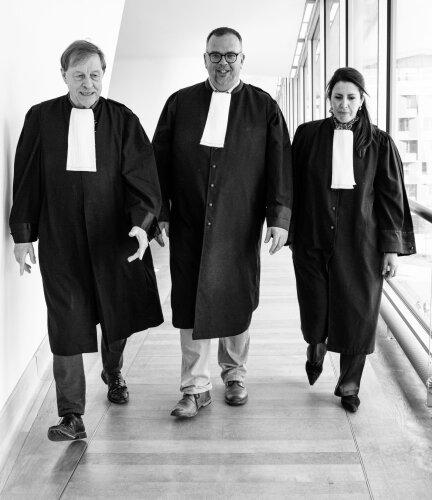Best Mining Law Lawyers in Belgium
Share your needs with us, get contacted by law firms.
Free. Takes 2 min.
Or refine your search by selecting a city:
List of the best lawyers in Belgium
About Mining Law in Belgium
Mining Law in Belgium is the branch of law governing the exploration, extraction, and management of mineral resources found within the country's territory. It regulates various activities involving the prospecting, licensing, development, and closure of mines. Belgium's mining regulations seek to balance economic interest, public safety, environmental protection, and local community concerns. Due to the country's federal structure, Mining Law can differ significantly between regions such as Flanders, Wallonia, and the Brussels-Capital Region, each having its own legislative competencies and regulatory framework.
Why You May Need a Lawyer
Legal assistance in the field of Mining Law is often required due to the complex and technical nature of mining regulations in Belgium. Common situations where a lawyer's help is valuable include:
- Applying for or renewing mining rights or permits
- Negotiating land access agreements or resolving property disputes
- Adhering to local, regional, and environmental regulations during mining operations
- Handling administrative appeals or litigation involving mining licenses or concessions
- Dealing with liability for environmental damage, health and safety issues, or rehabilitation obligations
- Navigating cross-border mining operations or foreign investment regulations
- Interpreting mineral royalty or taxation frameworks
- Interfacing with governmental bodies or participating in public inquiries and hearings
A lawyer with expertise in Mining Law helps ensure compliance, protect your interests, and reduce the risk of costly legal disputes.
Local Laws Overview
Belgium’s mining regulations are shaped by both federal and regional law, with significant decentralization since the late 20th century. The key aspects of local Mining Law include:
- Regional Competence: The authority over subsoil resources and mining activities mainly rests with the regions (Flanders, Wallonia, and Brussels-Capital), except for nuclear minerals which remain under federal jurisdiction.
- Licensing and Concessions: Mining activities require a license or concession, which is granted by the respective regional authorities. The process involves strict environmental, safety, and technical assessments.
- Environmental Protection: Mining projects must comply with rigorous environmental regulations, including mandatory impact assessments, public consultation procedures, and rules on site rehabilitation and restoration after mining ends.
- Land Access and Property Rights: Special provisions apply to land ownership, land use compatibility, and compensation rights for affected landholders and communities.
- Health and Safety: There are robust safety standards and inspection procedures governing mining workplaces, focused on protecting workers and local populations.
- Closure and Rehabilitation: Mining companies are obliged to submit closure plans that ensure proper restoration and handling of any post-mining liabilities.
Belgium also implements several relevant European Union regulations, especially regarding environmental safeguards and cross-border mining activities.
Frequently Asked Questions
What types of minerals are regulated by Belgian Mining Law?
Belgian Mining Law covers a range of minerals including coal, metals, stones, sand, gravel, and other subsoil resources. Radioactive minerals are regulated at the federal level.
Who grants mining rights or concessions in Belgium?
Regional authorities (Flemish, Walloon, or Brussels-Capital governments) are responsible for granting most mining rights or concessions, except for nuclear materials.
Is an environmental impact assessment required for all mining projects?
Yes, most mining projects must undergo a mandatory environmental impact assessment to identify and mitigate adverse effects on the environment and local populations.
How long does it take to obtain a mining permit or concession?
The duration varies based on project complexity, completeness of documentation, and the outcome of any public inquiries. The process can take several months to a few years.
Can individuals or communities oppose mining projects?
Yes, there are opportunities for public consultation and objections during the licensing process. Local stakeholders can submit comments or file legal appeals if they are adversely affected.
What are the main obligations of a mining operator in Belgium?
Operators must comply with licensing conditions, environmental standards, health and safety requirements, royalty or taxation obligations, and closure or rehabilitation requirements.
How are mining royalties determined?
Royalties and related taxes are set by regional legislation and may depend on factors such as mineral type, extracted quantity, and economic value. These are specified in the concession or permit terms.
What happens if a mining company fails to comply with legal obligations?
Failure to comply can result in administrative penalties, suspension or revocation of mining rights, liability for environmental damage, and potential civil or criminal proceedings.
Are foreign companies allowed to operate mines in Belgium?
Yes, foreign companies can apply for mining rights, subject to meeting the same legal and technical requirements as domestic entities.
What is involved in closing a mine legally in Belgium?
The operator is required to implement a closure and rehabilitation plan approved by the relevant authority, ensure environmental restoration, secure the site, and handle any ongoing liabilities.
Additional Resources
Several organizations and governmental bodies offer guidance and information on Mining Law in Belgium:
- Regional ministries or departments responsible for environment, economy, or natural resources (per region)
- Belgian Federal Public Service Economy (for nuclear minerals or nationwide regulations)
- Belgian Geological Survey for information on mineral resources
- Regional environmental protection agencies
- Professional mining associations and environmental NGOs
- Local chambers of commerce and industry bodies
These resources can provide up-to-date documents, guidelines, application forms, and further contact details for specialized advice.
Next Steps
If you need legal assistance in the area of Mining Law in Belgium, consider the following steps:
- Gather all available documentation about your mining project or interest, including property deeds, contracts, permits, and correspondence with authorities.
- Identify the specific issue or question you need help with, such as licensing, compliance, disputes, or environmental concerns.
- Seek out a qualified lawyer with experience in Belgian Mining Law. Focus on professionals familiar with regional regulations applicable to your area of concern.
- Contact local bar associations or legal aid services if you need help finding specialized legal counsel.
- Prepare to discuss your situation in detail and provide all necessary documentation to your lawyer for a thorough assessment.
Taking early legal advice is highly recommended to avoid unexpected obstacles and ensure your mining activities are fully compliant with Belgium’s complex legal framework.
Lawzana helps you find the best lawyers and law firms in Belgium through a curated and pre-screened list of qualified legal professionals. Our platform offers rankings and detailed profiles of attorneys and law firms, allowing you to compare based on practice areas, including Mining Law, experience, and client feedback.
Each profile includes a description of the firm's areas of practice, client reviews, team members and partners, year of establishment, spoken languages, office locations, contact information, social media presence, and any published articles or resources. Most firms on our platform speak English and are experienced in both local and international legal matters.
Get a quote from top-rated law firms in Belgium — quickly, securely, and without unnecessary hassle.
Disclaimer:
The information provided on this page is for general informational purposes only and does not constitute legal advice. While we strive to ensure the accuracy and relevance of the content, legal information may change over time, and interpretations of the law can vary. You should always consult with a qualified legal professional for advice specific to your situation.
We disclaim all liability for actions taken or not taken based on the content of this page. If you believe any information is incorrect or outdated, please contact us, and we will review and update it where appropriate.
Browse mining law law firms by city in Belgium
Refine your search by selecting a city.














